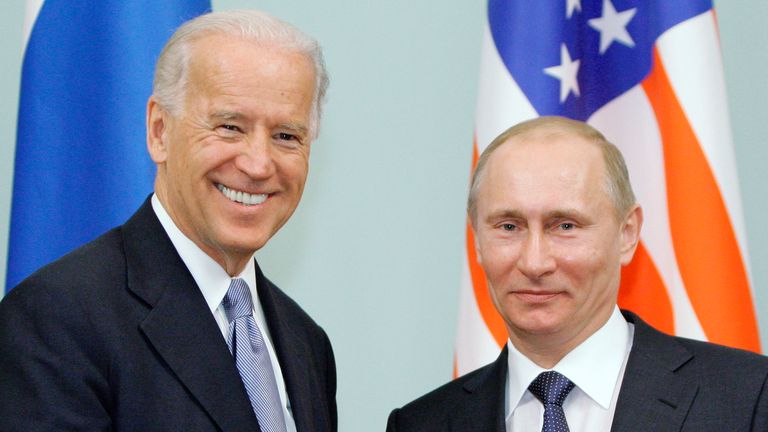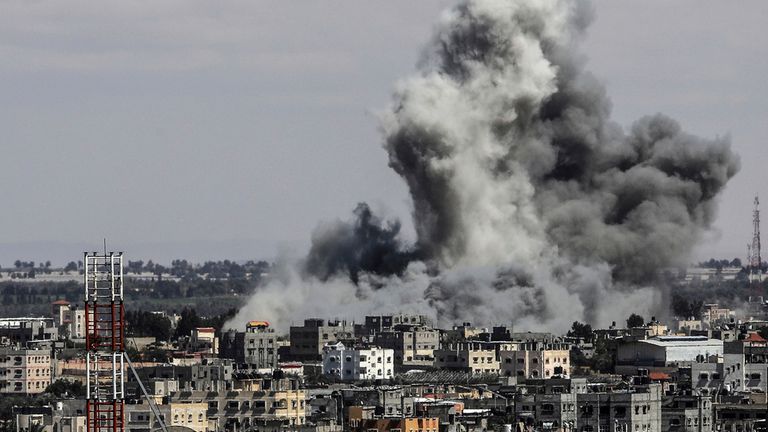Setting red lines is all very well, as long as you follow through when they are crossed. President Joe Biden knows that all too well.
But he also knows that if he follows through on this big new red line of withholding offensive weapons for Israel it could cost him dearly domestically.
The push-me-pull-you balance of geopolitics and domestic politics is intensely difficult right now for the American president.
Gaza latest: Follow live updates
I’ll break this down into two parts. The politics in a moment. First the challenges of red lines.
Western leaders throw them down in interviews, like Mr Biden’s pronouncement on CNN last night, as unequivocal threats. “Cross the line, if you dare!” is the rhetoric.
But too often they turn out to be flawed tools of geo-political diplomacy.
Barack Obama set a chemical weapons red line with Syria’s Bashar al Assad in 2012. He walked right through it.
Vladimir Putin remembered that when he walked through a red line Mr Biden had set on Ukraine in 2021. Mr Putin invaded. The rest is history.
Every red line is distinct, of course, and they vary in terms of the gravity of the event they are seeking to prevent.
But the principle behind laying them is the same, as is the message set when they are crossed.
Read more:
Israeli hostages’ families urge Netanyahu to accept deal
Israel claims control of key Rafah crossing
Biden’s frustration with Netanyahu
Over the past six months, as Israel has sought to defeat Hamas in Gaza, President Biden didn’t think he’d need to lay out red lines. After all, Israel is one of America’s closest allies.
Instead, the Biden administration thought gentle diplomacy and frank back-channels with a “close friend of America” would do the trick.
But gradually, as Mr Biden and the Netanyahu government increasingly diverged on protecting civilians and a plan for “the day after” in Gaza, a red line began to appear – Rafah.
This has become Mr Biden’s red line for Israel.
The American president has repeatedly made clear his opposition to Mr Netanyahu’s insistence on a ground invasion of the southern Gazan city (Mr Netanyahu’s own red line) where about 1.4 million people are living, half of them under 18.
The Israeli military has not (yet) moved into Rafah city but is instead concentrating its operations to the east of the city and around the crossing to Egypt.
That fact has allowed the Biden administration to claim its red line hasn’t yet been crossed. “They didn’t describe it as a major ground operation,” spokesman John Kirby said this week.
Sometimes, red lines are smashed through. Sometimes, they are gradually chipped away at.
To counter the chipping Mr Netanyahu has been doing for weeks, Mr Biden hardened his red line.
“I made it clear that if they go into Rafah – they haven’t gone in Rafah yet – if they go into Rafah, I’m not supplying the weapons that have been used historically to deal with Rafah, to deal with the cities – that deal with that problem,” he told CNN.
A significant admission
That he has personally admitted what was already a fact – that American weapons have killed thousands of civilians – is significant.
But there is important nuance in his red line.
He’s talking about stopping the delivery of offensive weapons for the type of operations that have flattened much of Gaza and could do the same to Rafah.
He is not threatening to cut Israel off from all US weapons, of course not.
Defensive weapons to counter Iranian proxy rockets will keep coming. As will long-range weapons and jets to counter Iran. None of that will stop being delivered.
Still, it’s a big shift for Biden. It’s not been done before and symbolically for Israel, in the middle of its longest and most critical war, it looks terrible.
The domestic political risks
And that brings us to the domestic politics of all this.
For every lever of influence Mr Biden pulls (and he’s seen they have their limited use) there is a domestic political calculus.
Pretty much all Republicans are against every lever; they want nothing less than unequivocal support for Israel.
More than that though – a significant number of his own Democrats will also be uneasy about America limiting weapons for Israel.
But critical voters in key states are very pro-Palestine. President Biden isn’t oblivious to their cry “Genocide Joe!”
It is a perilous political push-me-pull-you and the election is six months away.


